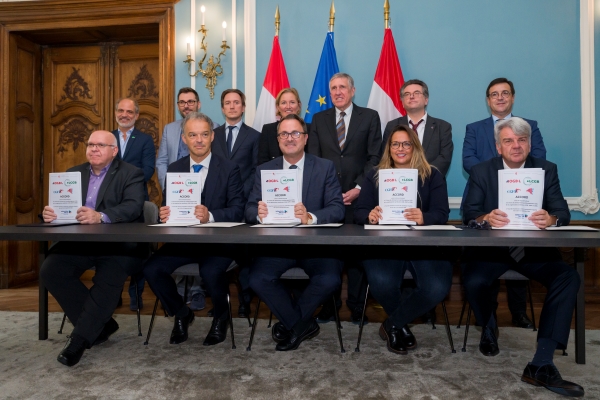 Credit: SIP / Jean-Christophe Verhaegen
Credit: SIP / Jean-Christophe Verhaegen
The author welcomes the measures announced during the Luxembourg national tripartite agreement (“Solidaritéitspak 2.0”) signed on Wednesday 28 September 2022, the second such fiscal support after the March 2022 tripartite agreement, with the main aim to counter the impact of exceptional rise in energy prices and inflation on Luxembourg households and the economy that followed shortly after the invasion of Ukraine by Russian forces in February 2022.
Tripartite agreement / Solidaritéitspak 2.0
The tripartite agreement brings together the Luxembourg Government, Employers' Association (Union des Entreprises Luxembourgeoises - UEL) and the LCGB, OGBL and CGFP trade unions, a cooperative alignment between the government, business lobby and trade unions to discuss and agree on collective measures. Whilst such negotiations may not always go smoothly, long-term industrial stability in Luxembourg could be attributed in part to this process and the recognised form of tripartite negotiations, as the various players come together to reach an agreement beforehand – this is not the case in various other countries.
Inflation versus growth
On Monday 26 September 2022, European Central Bank (ECB) President, Christine Lagarde, during a parliamentary hearing in Brussels, said: "It is essential that fiscal support used to shield those households from the impact of higher prices is temporary and targeted", echoing the need for fiscal measures adopted or planned in several European Union (EU) Member States to help vulnerable households. A week earlier, President Lagarde also mentioned that price stability is a top priority for ECB, backed up by action, an interest rate hike of 0.75%, a clear sign that for the ECB the primary goal is to contain inflation. The ECB has clarified its intention to make another "significant rate hike" in October and a potentially smaller one in December 2022.
These interest rate hikes are in response to double-digit inflation reported in the EU in August (10.1%), the highest recorded since European statistics agency Eurostat's data became available in January 2001.
To put interest rates and inflation in context, the author recalls that under normal circumstances, to spur business and growth, financial institutions and banks reduce interest rates to minimise borrowing costs for households and businesses, and hence stimulate economic activities. In contrast, while a positive inflation rate but one that remains below the 2% mark is generally considered a sign of a healthy economy, an even higher inflation means consumer prices are increasing too fast. Countermeasures such as an increase in interest rates are then employed to dampen the demand and help cool down the markets.
Taking cue from the ECB, it may be assumed that the largest monetary policymaker in the EU has shared the "recipe" for the fiscal support measures to the EU governments - to make measures temporary, targeted to vulnerable households and businesses, and contain inflation, even if it puts growth at risk.
Support measures
Keeping these guidelines in mind, Luxembourg has already proactively taken several measures, which include [plural verb] a first tripartite agreement in the form of a €830 million support package signed on 31 March 2022 and a second tripartite agreement in the form of a €1.1 billion support package signed on 28 September 2022.
Some of the targeted measures for households to cope with high inflation and high energy prices include [plural verb] a temporary reduction in fuel prices, a cost-of-living allowance (allocation de vie chère - AVC) and an energy allowance, both from €200 to €400 depending on the composition of the household, an energy tax credit (crédit d'impôt énergie - CIE), a freeze on rent increases (until December 2022), a freeze on electricity prices (from January to December 2023), a price cap on gas prices and a reduction in VAT rates.
According to the government, without these measures, Luxembourg households would have to pay €150 more per month.
In an interview on Tuesday 27 September 2022, Minister of Finance, Yuriko Backes, clarified that during the pandemic, the State spent €2.8 billion to help people and companies, and another €1.4 billion for aid and state guarantees for bank loans during the current crisis, but both were unplanned and adapted to the situation at hand. This would also mean that an already unplanned excess expenditure to the tune of €4.2 billion not only limits the scope and depth of current tripartite measures, but probably also means less appetite for measures which does not spur growth by business lobby and labour unions.
Vulnerable households, wage indexation
As part of the first tripartite agreement in March 2022, and in light of a wage indexation in April 2022, the next wage indexation was postponed until April 2023, a measure targeting businesses, companies and the State to have a period of twelve months of certainty in terms of wage expenses and likely under the assumption that inflation could be managed.
However, the exceptional rise in inflation led to the triggering of a first indexation in July 2022 and another could be possible as early as the last quarter of 2022.
In theory, taking these two wage indexations together and even excluding the possibility of an increased minimum social wage from January 2023, would mean that businesses, companies and the State have to pay about €1.8 billion more in remunerations, pensions and other allowances.
In terms of helping vulnerable households, which would include households at risk of poverty: for 18.3% of Luxembourg households (STATEC, 2020) and 45.5% of households with one parent with dependent children (Eurostat, 2021), the two wage indexations would also equate to up to an increase of €150 per month (own calculations), similar to the government assumption of saving with the second tripartite agreement measures, leaving vulnerable households more or less in a similar financial situation.
According to a summary published by STATEC on 30 September 2022 analysing the impact of the tripartite agreement measures on inflation and purchasing power for households in the lower quintiles (in terms of equivalised disposable income), the loss of indexed income was overcompensated by the drop in expenditure and the targeted measures and thus their purchasing power increased with the measures.
Jobs, housing
From a macroeconomic view, according to Fitch and DBRS Morning Star, the "Energiedësch" and the "Solidaritéitspak" from March 2022 were estimated to increase the government deficit by between 0.5% and 0.7% of GDP in 2022. Along with the current tripartite agreement, it is likely that investment and recruitment drives would be negatively impacted, at least in the short to medium term.
The housing market might see some swings as well. On the one hand, double-digit growth in house prices for the last twelve quarters (from Q2-2019 to Q1-2022) indicate a strong demand, but on the other hand, supply chain bottlenecks have pushed the prices further up]. Now with the rise in interest rates, households with floating interest rate repayments will come under stress, new potential buyers may shy away while households requiring renovations might delay or have to pay more. These developments are likely to skew the housing markets soon.
On a positive note, the job market remains stable (with a 4.7% unemployment rate in August 2022, according to Luxembourg’s employment agency ADEM), Fitch and DBRS Morning star confirmed the AAA investment rating for Luxembourg in July 2022, STATEC confirmed that the macroeconomic outlook remains stable and the Grand Duchy has the lowest budget deficit projected in the EU (ECB, April 2022), amongst others.
In summary, the current tripartite agreement seems to take economic burden and budget deficits in consideration but, like other EU Member States, remains vulnerable to volatile markets and price swings which might test Luxembourg households in need of further support in future.









